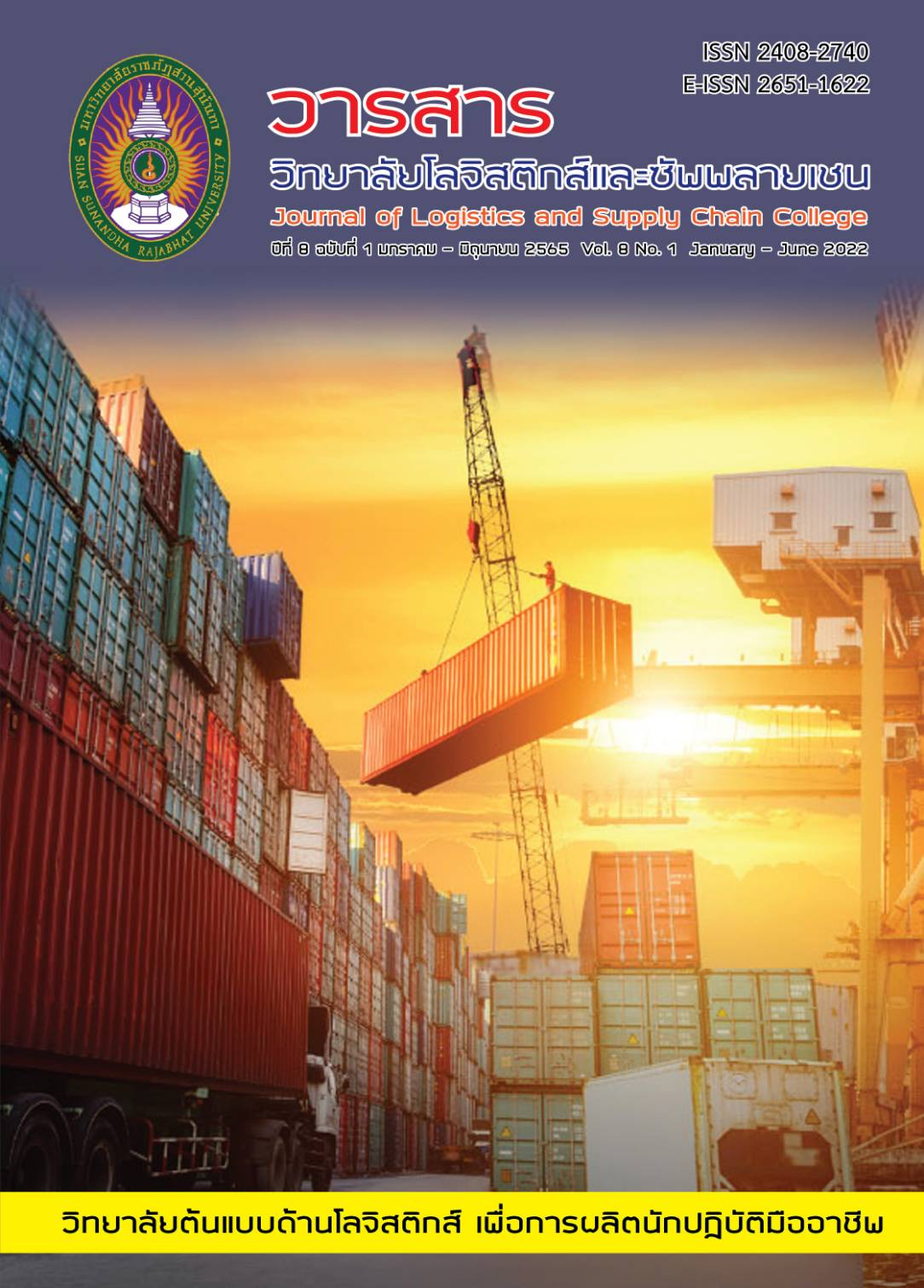Changing Dimensions of Purchasing Job in Beverage Manufacturing and Preparation of Staff for Supporting the Digital Industry Age
Keywords:
Dimensions of Change, Beverage Manufacturing, Digital Industry, PurchasingAbstract
The research objectives were 1) to study the changing dimensions in the purchasing job due to the beverage manufacturing industry changing in the digital age and 2) to study the preparation of purchasing staff in the beverage manufacturing industry for supporting the digital industry age. It was qualitative research study on the beverage manufacturers in Thailand, having 461 factories. Fifteen informants were specifically chosen from five selective factories. The structured interview was conducted, in which the questions were verified by three experts. The inductive analysis was used. The results were that 1) changing dimensions included (1.1) working processes: new working processes would arise; e-Procurement, e-Auction, e-Contract, (1.2) technologies: new technologies would occurred; web applications, mobile applications, online communication or meeting, cloud computing and storage, inter of things, and (1.3) staff: new skills and positive attitudes about changing would be required and that 2) preparation of purchasing staff included (2.1) skills: relevant skills would be needed; digital literacy, logical thinking, creativity, problem-solving, communication, (2.2) languages: foreign languages would be required; English, Chinese, and (2.3) attitudes: positive attitudes would be beneficial; positive thinking, learning new things, coexistence, teamwork. Therefore, the companies should provide support; training, new technologies, communication, and culture development.
References
กรมโรงงานอุตสาหกรรม. (2564). สถิติสะสมจำนวนโรงงานที่ได้รับอนุญาตให้ประกอบกิจการ (เปิดดำเนินการ) ตาม พ.ร.บ.โรงงาน พ.ศ. 2535 จำแนกตามหมวดอุตสาหกรรม ณ สิ้นปี 2563. ค้นเมื่อ 15 สิงหาคม 2564, จาก: https://www.diw.go.th/hawk/content.php?mode=spss64.
ถนัด แก้วเจริญไพศาล, บุญอนันต์ พินัยทรัพย์ และสมศักดิ์ ดำริชอบ. (2560). ความจำเป็นการพัฒนานักบริหารดิจิทัลเพื่อรองรับนโยบายประเทศไทย 4.0. กรุงเทพฯ. รายงานสืบเนื่องการประชุมวิชาการระดับชาติในวาระครบรอบ 62 ปี คณะรัฐประศาสนศาสตร์ สถาบันบัณฑิตพัฒนบริหารศาสตร์, วันที่ 5 มิถุนายน 2560 ณ อาคารนวมินทราธิราช สถาบันบัณฑิตพัฒนบริหารศาสตร์, 145-168.
ธนาคารออมสิน. (2563). อุตสาหกรรมอาหารและเครื่องดื่ม. ค้นเมื่อ 18 กรกฎาคม 2564, จาก: https://www.gsbresearch.or.th/wp-content/uploads/2021/01/IN_food_12_63.pdf.
บริษัท ทีโอที จำกัด (มหาชน). (2562). Digital Transformation คืออะไร สำคัญอย่างไรกับธุรกิจและองค์กร. ค้นเมื่อ 17 มกราคม 2564, จาก: https://www.tot.co.th.
บริษัท ริเวอร์พลัส จํากัด. (2562). แนวโน้มอุตสาหกรรมเครื่องดื่มของไทย ปี 2019 - 2021. ค้นเมื่อ 18 กรกฎาคม 2564, จาก https://riverplus.com/beverage-industry-2019-2021.
พิชิต ขจรเดชะ. (2562). Future Skills: ทักษะแห่งอนาคตที่จำเป็นสำหรับบุคลากรทางการพิมพ์และบรรจุภัณฑ์. วารสารการพิมพ์ไทย, 118, 2-3.
วรรณา ยงพิศาลภพ. (2562). แนวโน้มธุรกิจ/อุตสาหกรรมปี 2562-2564: อุตสาหกรรมเครื่องดื่ม. ค้นเมื่อ 15 สิงหาคม 2564, จาก: https://www.krungsri.com/th/research/industry/industry-outlook/Food-Beverage/Beverage/IO/io-beverage-20-th.
ศูนย์วิจัยกสิกรไทย. (2564). ตลาดเครื่องดื่มไม่มีแอลกอฮอล์ ปี ’64 คาดแตะ 2 แสนล้านบาท เครื่องดื่มสุขภาพและตอบโจทย์เฉพาะกลุ่มเติบโตดีกว่าตลาด. ค้นเมื่อ 16 กรกฎาคม 2564, จาก: https://kasikornresearch.com.
สมยศ พุ่มพันธุ์ม่วง และโสภา ชปีลมันน์. (2554). ตัวแบบการพัฒนาสมรรถนะด้านการปราบปรามของตำรวจนครบาล. วารสารวิชาการบัณฑิตวิทยาลัยสวนดุสิต, 7(2), 89-97.
สมาคมบริหารงานจัดซื้อและซัพพลายเชนแห่งประเทศไทย. (2564). บทบาทและหน้าที่ในงานจัดซื้อ. ค้นเมื่อ 20 พฤษภาคม 2564, จาก: http://pscmt.or.th.
อัมพวรรณ หนูพระอินทร์ และธีราวรรณ จันทร์แสง. (2563). โลจิสติกส์กับการพัฒนาอุตสาหกรรมไทย ยุค 4.0. WMS Journal of Management, 9(1), 118-129.
Chouhan, V.S., & Srivastava, S. (2014). Understanding Competencies and Competency Modeling – A Literature Survey. Journal of Business and Management, 16(1), 14-22.
Haseeb, M., Hussain, H.I., Slusarczyk, B., & Jermsittiparsert, K. (2019). Industry 4.0: A Solution toward Technology Challenges of Sustainable Business Performance. Social Sciences, 8(5), 154. https://doi.org/10.3390/socsci8050154.
Infor. (2017). How Process Manufacturers can Prepare for the Factory of the Future. Retrieved July 18, 2021, From: https://www.comactivity.com.au.
Leavitt, H. (1962). Applied organizational change in industry. Pittsburgh: Carnegie Institute of Technology, Graduate School of Industrial Administration.
Prodan, M., Prodan, A., & Purcarea, A. A. (2015). Three new dimensions to people, process, technology improvement model. In A. Rocha, A. M. Correia, S. Costanzo, & L. P. Reis (Eds.), New contributions in information systems and technologies advances in intelligent systems and computing, 353(481-490). London: Springer Link Publishing. doi:10.1007/978-3-319- 16486-1_47.
Vaidya, S., Ambad, P., & Bhosle, S. (2018). Industry 4.0 - A Glimpse. Procedia Manufacturing, 20, 233–238. https://doi.org/10.1016/j.promfg.2018.02.034
Weele, A.J.V. (2005). Purchasing & Supply Chain Management: Analysis, Strategy, Planning and Practice. 4th ed. London: Thomson.



